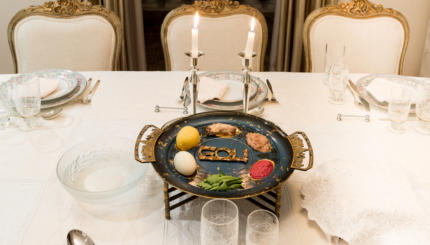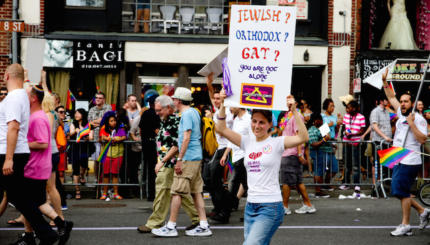In addition to the six items traditionally included on the seder plate — egg, karpas, shankbone, haroset, bitter herbs and hazeret — some Jews have in recent years adopted the custom of adding an orange.
The tradition dates back to the 1980s, when Susannah Heschel, a Jewish feminist scholar and the daughter of Jewish social justice icon Rabbi Abraham Joshua Heschel, learned about an early feminist Haggadah suggesting the addition of a crust of bread to the seder plate as a solidarity gesture with Jewish lesbians. The idea came from a short story in which a Jewish lesbian is told by a Hasidic rabbi that there’s as much room for a lesbian in Judaism as there is for a bread on the Passover table.
Heschel felt that including bread on the seder plate was a step too far. Bread is the quintessential non-Passover food, all traces of which are traditionally removed from the home prior to the holiday. So instead, Heschel chose to include an orange at her next seder to symbolize the inclusion of gays and lesbians alongside other marginalized groups. Seder participants were invited to spit out the seeds as a gesture of repudiation of homophobia.
“I chose an orange because it suggests the fruitfulness for all Jews when lesbians and gay men are contributing and active members of Jewish life,” Heschel has said.
With your help, My Jewish Learning can provide endless opportunities for learning, connection and discovery.
The custom has often been erroneously described as a feminist one inspired by an Orthodox man once telling Heschel that a woman belongs on the bimah of a synagogue as much as an orange belongs on the seder plate. But that history is false. As Heschel herself has written:
Somehow, though, the typical patriarchal maneuver occurred: My idea of an orange and my intention of affirming lesbians and gay men were transformed. Now the story circulates that a man said to me that a woman belongs on the bimah [podium of a synagogue] as an orange on the seder plate. A woman’s words are attributed to a man, and the affirmation of lesbians and gay men is erased. Isn’t that precisely what’s happened over the centuries to women’s ideas?
seder
Pronounced: SAY-der, Origin: Hebrew, literally "order"; usually used to describe the ceremonial meal and telling of the Passover story on the first two nights of Passover. (In Israel, Jews have a seder only on the first night of Passover.)
hametz
Pronounced: khah-METZ or KHUH-metz, Origin: Hebrew, bread or any food that has been leavened or contains a leavening agent. Hametz is prohibited on Passover.
bimah
Pronounced: BEE-muh, Origin: Hebrew, literally "stage," this is the raised platform in a synagogue from which services are led and the the Torah is read.



